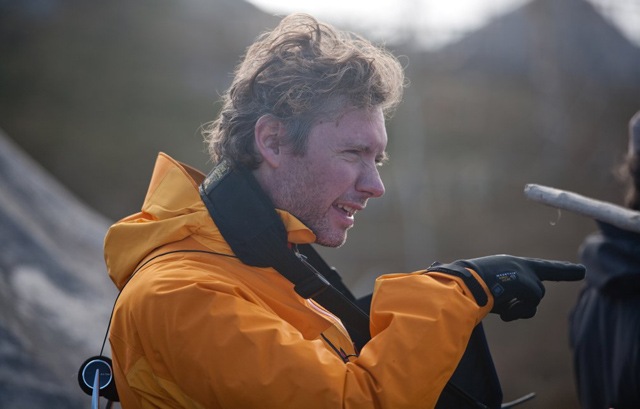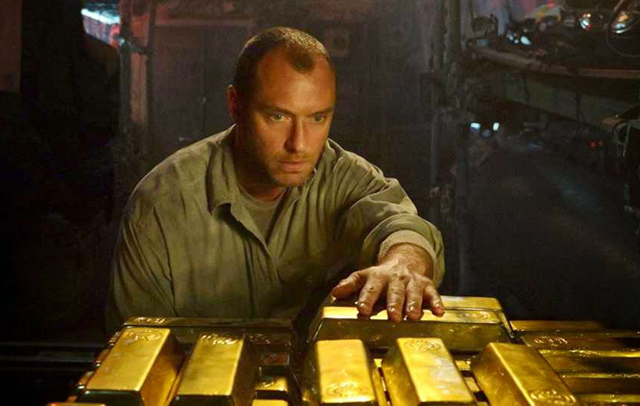CHICAGO – The Steppenwolf Theatre of Chicago continues to provide different viewpoints on the American stage, and their latest “Little Bear Ridge Road” is no exception. Featuring ensemble member Laurie Metcalf, it’s the resonate story of a family at the crossroads. For tickets/details, click LITTLE BEAR.
Interview: Director Kevin Macdonald Gets Under His ‘Black Sea’
CHICAGO – The old fashioned paranoid thriller lives, with the release of ‘Black Sea,’ a submarine movie that combines elements of the silent running of those underwater tin cans with the motivation of finding treasure – in this case Nazi gold – that has been buried where it sunk 70 years ago. The director of this film, Kevin Macdonald, creates a nail biting tension in the will-they-or-won’t-they survival mode of the British and Russian members of the submarine’s crew, led by Captain Robinson (Jude Law).
The Scotland-born Macdonald began his career as a notable documentary maker, winning an Oscar for his documentary “One Day in September” (1999), about the raid by Palestinian terrorists of the 1972 Munich Olympics. But he has also spun some Oscar gold in the narrative category, as Forest Whitaker won Best Actor for the Macdonald directed “The Last King of Scotland.” He continued to produce both features (“State of Play,” “The Eagle”) and documentaries (2012’s “Marley”), with “Black Sea” being his 14th full length film.

On Set with Director Kevin Macdonald of ‘Black Sea’
Photo credit: Focus Features
Kevin Macdonald was interviewed by HollywoodChicago.com in a roundtable with another media outlet (designated as “QUESTION”), and described a fascinating process for his current film and a fascinating overall career.
HollywoodChicago.com: What were the circumstances of soliciting Dennis Kelly’s script, and creating this combination of ‘Run Silent, Run Deep’ and ‘Treasure of Sierra Madre’?
Kevin Macdonald: It was actually an idea I came up with…15 years ago there was this terrible Russian submarine disaster – the Kursk – in which a bunch of sailors were trapped less than 100 meters under the sea, and suffocated to death. I thought that was a terrifying scenario, and I began to think about a submarine drama that wasn’t naval and looking for something valuable. I hooked up with Dennis Kelly, and he wrote a script.
QUESTION: There are themes of class warfare in ‘Black Sea,’ the 1% again exploiting the lower classes. What were you trying to say about that?
Macdonald: It was an idea about how to make a ‘heist’ movie with a motivation that was a little bit more complex. In thinking about why these guys would do such a dangerous mission, I looked to films like ‘Wages of Sin’ and its remake, ‘The Sorcerer’ – which I showed to the cast to get them in the proper buy-in. The idea that you have people motivated by the sense they’ve been thrown on the scape heap, the blue collar man that society no longer values. We all feel a resentment toward that 1% faceless element, who seem to be making out like bandits while we all struggle. I like the idea that the characters had this resentment, and how it subsequently warps their perspective.
Dennis and I never personified who the faceless corporation that motivates the mission is, because it’s not about them, but what it does for the people that are hired for the mission. It was about the journey toward what becomes important, in the scenario that is set up for them.
HollywoodChicago.com: What I found meticulous about the suspense in your film was how it built, and how the sea encapsulated the crew in their world. What type of planning technique created this tension and how much of it were you able to develop in post production?
Kevin Macdonald: Much of the tension was already in the script. Tension is a rhythm, about how long to withhold information, and keeping uncertainly going. The editor and I worked together on those beats, it is the nitty-gritty of the filmmaking. A scene can have no tension at all, but add some filmmaking and it can change. It’s hard to talk about, it’s more about the gut rhythm that develops. The most tense question in the film to me is whether they are getting off the sub or not. I wanted the audience to feel that as well.
QUESTION: Speaking of tension, the transporting of the gold under the sea has an almost science fiction/other planet type of feeling. How did you build that sequence?
Macdonald: We talked about that under-the-sea element, referencing the film ‘Alien’ and the surface they encountered. It’s the feeling of wind blowing, murkiness and transferring that to under the sea. We shot the surface of the sea in a tank, made of memory foam with sand on top of it. The foam contained bromide, which reacted with the water and turned it bright florescent green. We had to empty the entire tank, wasting time and money.
QUESTION: What was the background of finding the submarine you used as the exterior style?
Macdonald: I wanted to start with what the real thing looked like, and build out from that. I found it in Rochester, in a Thames River estuary. A crazy guy bought it twenty five years ago when the Soviet Union collapsed, and it was just sitting there. It can be rented out for parties. [laughs] Dennis Kelly and I went to this sub to do research, and when we got there it was a perfect time capsule of ‘Soviet-ness,’ so perfectly awful in its design. We shot the first couple of weeks on that sub, which gave an idea to the actors what it was like.
HollywoodChicago.com: There is a mystery to your filmmaker grandfather, Emeric Pressburger, that you explored in your very first documentary, ‘The Making of an Englishman.’ In your opinion, what is inherent in his creative soul that allowed him and partner Michael Powell to make such unforgettable stories of the human condition?
Macdonald: I’m not sure I can answer that. [laughs] I can say that there is a magical quality to their films, that grow in reputation seemingly every year. It’s easy to forget that before the video era, in the 1960s until well into the ‘80s, no one knew about those films. It was only because Francis Ford Coppola and Martin Scorsese started talking about them, that their reputations re-emerged.
I recently saw a revival of ‘The Life and Death of Colonel Blimp’ at the Berlin Film Festival, and it was a moving cinema experience. The complexity of it, since it was made during World War II as a propaganda film, and the Germans are depicted with such subtleness, was outrageous. This was while Britain was in complete crisis, and could have fallen to the Nazis at any time, they were making this moral distinction of having complex German characters. If this were competing in the acting categories at the Oscars now, it would clean up. You have two guys aging forty years, and Deborah Kerr portrayed three different roles. That’s the ultimate Oscar movie.

Jude Law as Captain Robinson, With the Stuff Dreams Are Made Of in ‘Black Sea’
Photo credit: Focus Features
HollywoodChicago.com: You made an interesting statement in the description for your documentary, ‘My Enemy’s Enemy,’ in which you discovered through the making of it that despite all we’re indoctrinated in regarding democracy or republic, that the fascist ideology practiced by Hitler was actually the philosophy that prevailed in the World War II. How does this philosophy damage our society and culture, in your opinion?
Macdonald: An argument can be made that elements of fascism survived because – even before World War II was won – the ‘enemy’ became the Soviet Union. Who could you trust to fight the Communists? It was the fascist philosophy. You had it in Europe, and to a lesser degree in America, the right-wing philosophies that were popular in Italy became the way to fight the Communists.
The Allies also knew the guys like Klaus Barbie [the subject of the film] were in Argentina, but they wanted to use them rather than capture them. Barbie was head of the manhunt, for example, of Che Guevara in Central America. The CIA knew he was there as well. I was fascinated about the moral grayness of it all, because we’re all taught we ‘won’ the war.
QUESTION: What do you feel is the best part of your job?
Macdonald: What I love about making films is just entering into the different world that each film requires. For ‘Black Sea,’ it was learning about submarines, casting Russian actors and concentrating on the artifact about it all. And then afterwards doing something else. It’s like being a journalist I suppose, with each assignment is different. That’s the fun part.
HollywoodChicago.com: In your Oscar winning film ‘One Day in September,’ you were able to track down one of the last terrorist of that tragedy in Munich. What did you learn about the face of terrorism through that experience that we should be listening to today, in our current state of being?
Macdonald: I don’t know if it has any relevance to today, but what I learned was regarding the guy that I met, and the other Palestinians who were involved in way or another, is that they are human beings. They had motivations, political or personal, and look back with both regret and justification.
I think with the younger ones – and the guy I found was only 19 years old when he participated in the Munich raid – is that they think its glamorous to do these acts, and gives them a cache. The guy I interviewed was second generation in a refugee camp in Lebanon, dirt poor, and the more I learned about terrorism the more I realized that at its root it becomes about economic conditions.
 | By PATRICK McDONALD |


